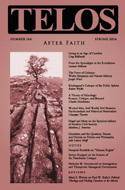Giuseppe Tassone’s “Wicked Men, Evil World: Evil between Psychoanalysis and Historical Materialism” appears in Telos 166 (Spring 2014). Read the full version online at the Telos Online website, or purchase a print copy of the issue in our store.
 Slavoj Žižek and Terry Eagleton have recently deployed the neo-Lacanian appropriation of Kant’s notion of radical evil in favor of an emancipatory politics of terror. For Žižek, there is a “progressive” passion for the Real that is aimed at universal justice. Similarly, Eagleton insists that there is a “good” will to nothingness that, if embodied by the wretched of the earth—that is, the victims of global capitalism—can lead to a radical transformation of society. In this article, I argue that Žižek’s and Eagleton’s accounts of terror are problematic as long as they are based on the assumption that there is a fundamental ontological flaw in human will to which the most intractable horrors of history are to be traced down. Following Adorno, I contend that evil is a social category or, in Adornian terms, an expression of the oppressive totality of which individuals as such are not responsible, and that, in the rationalized society of late capitalism, evil individuals such as Iago and Richard III have become impossible.
Slavoj Žižek and Terry Eagleton have recently deployed the neo-Lacanian appropriation of Kant’s notion of radical evil in favor of an emancipatory politics of terror. For Žižek, there is a “progressive” passion for the Real that is aimed at universal justice. Similarly, Eagleton insists that there is a “good” will to nothingness that, if embodied by the wretched of the earth—that is, the victims of global capitalism—can lead to a radical transformation of society. In this article, I argue that Žižek’s and Eagleton’s accounts of terror are problematic as long as they are based on the assumption that there is a fundamental ontological flaw in human will to which the most intractable horrors of history are to be traced down. Following Adorno, I contend that evil is a social category or, in Adornian terms, an expression of the oppressive totality of which individuals as such are not responsible, and that, in the rationalized society of late capitalism, evil individuals such as Iago and Richard III have become impossible.


